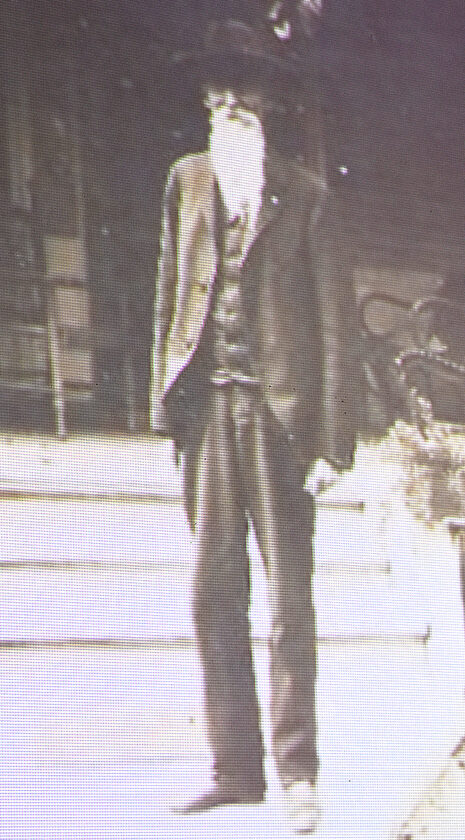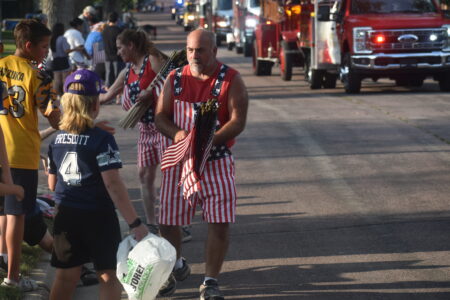Pfaender made name for himself with war exploits, civic service

Staff photo by Clay Schuldt The Brown County Historical Society’s “Lunch and a Bite of History” program on Thursday featured the life of Wilhelm Pfaender, “The Grand Old Man of New Ulm.”
NEW ULM– Spend any time in New Ulm, and you will eventually hear or see the name “Pfaender.”
Pfaender is the name of the street and city park, and it also appears throughout the city’s history. The first Pfaender in New Ulm was Wilhelm Pfaender. and by the time of his death. he would take on the nickname “The Grand Old Man of New Ulm.”
During the Brown County Historical Society’s “Lunch and a Bite of History,” Wilhelm Pfaender’s great-grandson George Downs gave a presentation of his great-grandfather’s life.
After moving to New Ulm a few years ago, Downs said he began looking into his great-grandfather’s life. Downs and his wife have traveled extensively in their lives, living in two countries and six states. Around four or five years ago, they decided they wanted to settle down somewhere they had roots. Downs realized his roots were in New Ulm, where his grandparents and great-grandfather lived.
Not long after moving to town, Downs began seeing the Pfaender name everywhere. In German Park, there is a sign with the founder’s name — Pfaender is listed as the “Grand Old Man of New Ulm.” Downs wanted to figure out what that meant.
Wilhelm Pfaender was born July 6, 1826, in Heilbornn, Wurtemburg, Germany. He and his friends learned of the Turnverein movement and opened Turnverein in Heilbronn. Throughout his life, Wilhelm would help found five separate Turnverein clubs in five different communities.
At age 22, Pfaender left Germany for political reasons. He briefly stopped in London, England, to visit his brother, Karl Pfaender. Karl Pfaender was an advocate for German workers in England and was connected to an organization with Fredrich Engels and Karl Marx. The group would eventually become the Communist Party.
Karl Pfaender’s great-great-great-granddaughter would eventually find success as a pop singer with the Spice Girls. Downs said Posh Spice is his third cousin, twice removed.
Wilhelm Pfaender ultimately came to the United States and settled in Cincinnati, Ohio, where many German immigrants lived. He was in Cincinnati long enough to help found a Turnverein but moved to Newport, Kentucky to escape a cholera epidemic. He formed another Turnverein in Newport and married his wife Katherine.
In 1855, an anti-immigrant group called the Know Nothings began making life difficult for German immigrants, resulting in a riot. Following the conflict, Pfaender wrote a letter to fellow members of the Turnverein, suggesting they build a town of their own. The national Turnverein approved the plan and began seeking a spot of land out west. Eventually, Pfaender learned of the Chicago Land Associations’ venture in New Ulm, Minnesota. New Ulm has been established, but the town needed money and people. Pfaender was able to negotiate the purchase of the town on the promise of more people and more money.
In the fall of 1856, Pfaender arrived in New Ulm. The First Turner meeting was held on Nov. 11, 1856, a few miles from Pfaender’s farm. Turner Hall was named after the group.
Less than a year later, the Steamer “Frank Steele” arrived in New Ulm from Cincinnati with 60 to 70 families, as Pfaender had promised.
Pfaender was active in the early days of New Ulm. He was a farmer, president of the land organization, justice of the peace, postmaster and wrote the first charter for New Ulm.
Downs said what impressed him most about the first charter was that Pfaender included a paragraph establishing New Ulm as a community of religious freedom. Everyone was free to practice what they want.
In 1860, Pfaender served as a presidential elector and cast his vote for Abraham Lincoln. During the Civil War, Pfaender served in the Minnesota First Artillery as a first lieutenant with the 1st Minnesota Artillery. Pfaender fought at the battle of Shiloh in April 1862. His involvement in the battle might have helped secure a Union victory, which during the first day was looking like another Union defeat. The battle during the second day was particularly brutal, and at one point it seemed like the Union line would break, but Pfaender managed to rally the troops under his command and were successful in repelling the Confederate advance.
There is a monument at the Shiloh battlefield honoring the 1st Minnesota Artillery that references Pfaender contributions.
Four months after Shiloh, New Ulm was attacked as part of the Dakota war. Pfaender’s wife, Katherine, and his children were brought into New Ulm during the battle.
Pfaender was sent home because of the battle, and he became the commandant of Fort Ridgely and was promoted to colonel. He was discharged from the army in 1865 and went back to farming. He was soon elected mayor of New Ulm.
In 1870, Pfaender was elected state senator. He was also the state treasurer from 1876-80.
In 1881, New Ulm was hit by a tornado. Pfaender formed a committee to seek relief from the governor. They received $40,000 to repair the city. Pfaender was in charge of distributing the relief money. This is likely how he get into the insurance business, which he ran during his later years.
During his final years, Pfaender lived at a house on Broadway. It is said that whenever a parade would pass down Broadway, Pfaender would watch from his home, and everyone would salute him as they passed by.
Pfaender died on Aug. 11, 1905. An article written after his death said, “More than any other man in the city, Col. Pfaender is recognized as the first citizen, the grand old man of New Ulm.”
Downs credited his ancestor with great confidence, the ability to lead and the willingness to make a civic contribution over personal gain.




